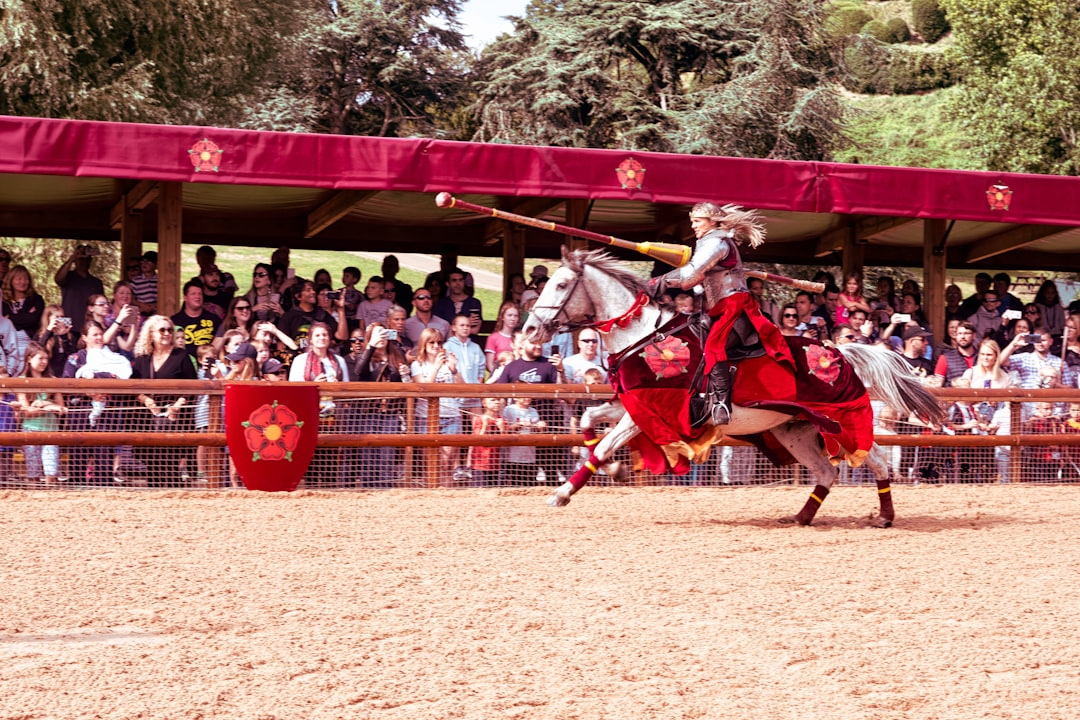Are you confused as to why there is a photo of a woman jousting on a post about the word “career?” If you are, then you’re about to learn something. If you’re not, then give yourself a pat on the back for already having some solid cognate cognizance.
The meaning of “job” or “profession” for “career” is not the original sense of the word, so let’s look at what those original senses are.
career — as a noun, “career” is a “course” or “passage” of something, the “speed” of something, a “charge” or “encounter” in a tournament, or when referring to a horse, it is “a short gallop or a run at full speed.”
As a verb, “career” means “to make a short gallop or charge,” or it means “to go, drive, or run at top speed.”
carrera — the Spanish noun whose first meaning tends to be a “race” or a “course” and whose later meaning is a “career/profession.”
These words come to us from Latin’s carrus for “wheeled vehicle.” In Spanish, one word for “car” is “carro.” You can easily see that those two words are cognates and came to us from that same Latin word. (As does “cart” which is also a vehicle that has wheels on it.)

When I was teaching Spanish, the word “carrera” would come up in stories or sentences that were sports-related. Typically, the word would translate as a “race” in those instances, but my students would see the word and assume it meant “career” and that would confuse them because they only knew the word “career” in the sense of a “profession.”
However, that sense of the word originated from those earlier meanings that deal with the “course” in which something travels or the “speed” at which it travels. A horse in full career is at full gallop. Over time, when you look at the full “course” that your profession took, it came to be called your “career,” and then the word shifted a bit to refer more to one’s profession than to the “course” or “passage” you took along the way.
Thus, the word “career” is perfect for the course of one’s professional life and tends to be used only for people who follow a more consistent path instead of for those who jump from job to job. I had a long “career” as a teacher, and now I’m very set on my course, or “career,” as a writer.
As a verb, I think the word isn’t used much, but it’s a great word. “Where are you careering off to?” gives a very vivid image of a child rushing at full speed through the house or down a hallway while also a bit out of control.
Since it isn’t used much in reference to speed, my students didn’t know the word “career” as anything other than “profession,” so when “carrera” would appear in sentences about someone winning the “carrera” in the competition, they would be confused. It wasn’t a word that they ever became adept at recalling to mean a “race” because they couldn’t make that connection between “career” and “carrera.”
Just look at the beginning of the words. The word “car” is in both of them. What does a car do? It goes fast, and sometimes it’s used in a “race” or a “carrera.”
Today, when you watch the sun’s career (la carrera del sol) or the moon’s career (la carrera de la luna) across the sky, think of the word “career” in a new way. Run your own race in life, focus on your own career, and keep improving your cognate cognizance.
Until next time.
This was the free post for February. If you’re not a paying subscriber, consider becoming one to get these each week. Non-paying subscribers missed out on “cuneiform,” “culpable,” “rancor,” and “promise.” I promise you it’s worth a few dollars a month to keep improving your vocabulary skills. Thanks.
Tammy Marshall













